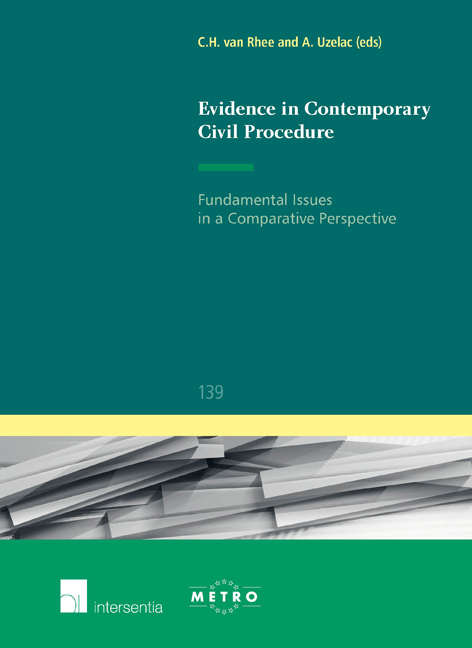Book contents
- Frontmatter
- Contents
- List of Authors
- Acknowledgements
- INTRODUCTION
- FUNDAMENTAL AND OTHER PRINCIPLES OF EVIDENCE IN CIVIL LITIGATION
- TYPES OF EVIDENCE IN CIVIL LITIGATION
- WITNESS TESTIMONY IN DUTCH CIVIL PROCEDURE: FACTS, FIGURES AND STATISTICAL RELATIONS
- CURBING ADVERSARIAL EXCESSES: AN EVALUATION OF THE EXPERT EVIDENCE REGIME IN HONG KONG AFTER THE CIVIL JUSTICE REFORM (WITH A FOCUSED STUDY ON PERSONAL INJURY LITIGATION)
- THE NEW RULES OF EXPERT EVIDENCE IN MACEDONIAN CIVIL PROCEDURE: ARE THEY A FAILED EFFORT AT REFORM?
- EVIDENCE IN ARBITRATION AND NATIONAL CIVIL LITIGATION
- REGISTRAR
- EVIDENCE IN CROSS BORDER CIVIL LITIGATION
- IUS COMMUNE EUROPAEUM
CURBING ADVERSARIAL EXCESSES: AN EVALUATION OF THE EXPERT EVIDENCE REGIME IN HONG KONG AFTER THE CIVIL JUSTICE REFORM (WITH A FOCUSED STUDY ON PERSONAL INJURY LITIGATION)
from TYPES OF EVIDENCE IN CIVIL LITIGATION
Published online by Cambridge University Press: 15 December 2017
- Frontmatter
- Contents
- List of Authors
- Acknowledgements
- INTRODUCTION
- FUNDAMENTAL AND OTHER PRINCIPLES OF EVIDENCE IN CIVIL LITIGATION
- TYPES OF EVIDENCE IN CIVIL LITIGATION
- WITNESS TESTIMONY IN DUTCH CIVIL PROCEDURE: FACTS, FIGURES AND STATISTICAL RELATIONS
- CURBING ADVERSARIAL EXCESSES: AN EVALUATION OF THE EXPERT EVIDENCE REGIME IN HONG KONG AFTER THE CIVIL JUSTICE REFORM (WITH A FOCUSED STUDY ON PERSONAL INJURY LITIGATION)
- THE NEW RULES OF EXPERT EVIDENCE IN MACEDONIAN CIVIL PROCEDURE: ARE THEY A FAILED EFFORT AT REFORM?
- EVIDENCE IN ARBITRATION AND NATIONAL CIVIL LITIGATION
- REGISTRAR
- EVIDENCE IN CROSS BORDER CIVIL LITIGATION
- IUS COMMUNE EUROPAEUM
Summary
Introduction
While the court is the ultimate finder of facts, a case may involve such highly technical issues that the court is unable to discharge its fact-finding function unless qualified persons assist in the process. As the learned Hong Kong district judge in Chan Shu Wing v. Link Management Ltd said: ‘Expert evidence is relevant if it will assist the court to resolve one or more relevant issues in dispute in the cause or matter and the issue is not one which the court can come to an informed decision without such expert evidence.’
The Hong Kong expert evidence regime in the past was highly adversarial. It was not uncommon that experts were instructed as ‘hired guns’. Instead of assisting the court to find the truth, adversarial experts acted more like advocates than witnesses. Part A of this contribution seeks to expound the procedural framework for the use of expert evidence in civil lawsuits, highlighting those changes made pursuant to the Civil Justice Reform to tackle the adversarial excesses in the system. Part B of this contribution explores expert evidence within the context of personal injury litigation in Hong Kong (which is governed under a set of specialist rules). Given the nature of personal injury disputes, the use of expert evidence is essential in the fact-finding process. The way expert evidence is deployed and managed under the specialist rules in personal injury litigation provides invaluable insight for further reform in the general procedural regime.
Part A: An overview of the expert evidence regime after the Civil Justice Reform in Hong Kong
The Role of the Expert in Civil Litigation
The role of the expert in civil litigation is clear under the law. An expert witness, in assisting the court, should give independent and unbiased opinions on matters within his own expertise. It is not the function of the expert witness to usurp the role of the court in the fact-finding process or to assume the role of an advocate. By definition, expert witnesses are authorities in specialist areas where no layman (including the judge) is capable of navigating by himself.
- Type
- Chapter
- Information
- Evidence in Contemporary Civil ProcedureFundamental Issues in a Comparative Perspective, pp. 193 - 222Publisher: IntersentiaPrint publication year: 2015

